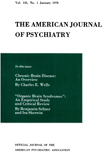EMOTIONAL ASPECTS OF CARDIAC DISEASE
Abstract
The diagnosis of heart disease is an emotionally charged life situation. The anxiety engendered may tax the reserves of the diseased cardiovascular system, and influence the medical course and response to therapy, as well as the patient's personality function. The doctor-patient relationship is the most important factor in the total handling of the cardiac patient; it provides the matrix within which all aspects of the problem may be organized into a unified process. The psychiatrist who is supervising or advising a physician treating a cardiac patient will find that his efforts will be most effective and satisfying, in most instances, when they are directed toward alleviating anxiety in both the patient and the physician, and in fostering between them a constructive therapeutic relationship.
Access content
To read the fulltext, please use one of the options below to sign in or purchase access.- Personal login
- Institutional Login
- Sign in via OpenAthens
- Register for access
-
Please login/register if you wish to pair your device and check access availability.
Not a subscriber?
PsychiatryOnline subscription options offer access to the DSM-5 library, books, journals, CME, and patient resources. This all-in-one virtual library provides psychiatrists and mental health professionals with key resources for diagnosis, treatment, research, and professional development.
Need more help? PsychiatryOnline Customer Service may be reached by emailing [email protected] or by calling 800-368-5777 (in the U.S.) or 703-907-7322 (outside the U.S.).



